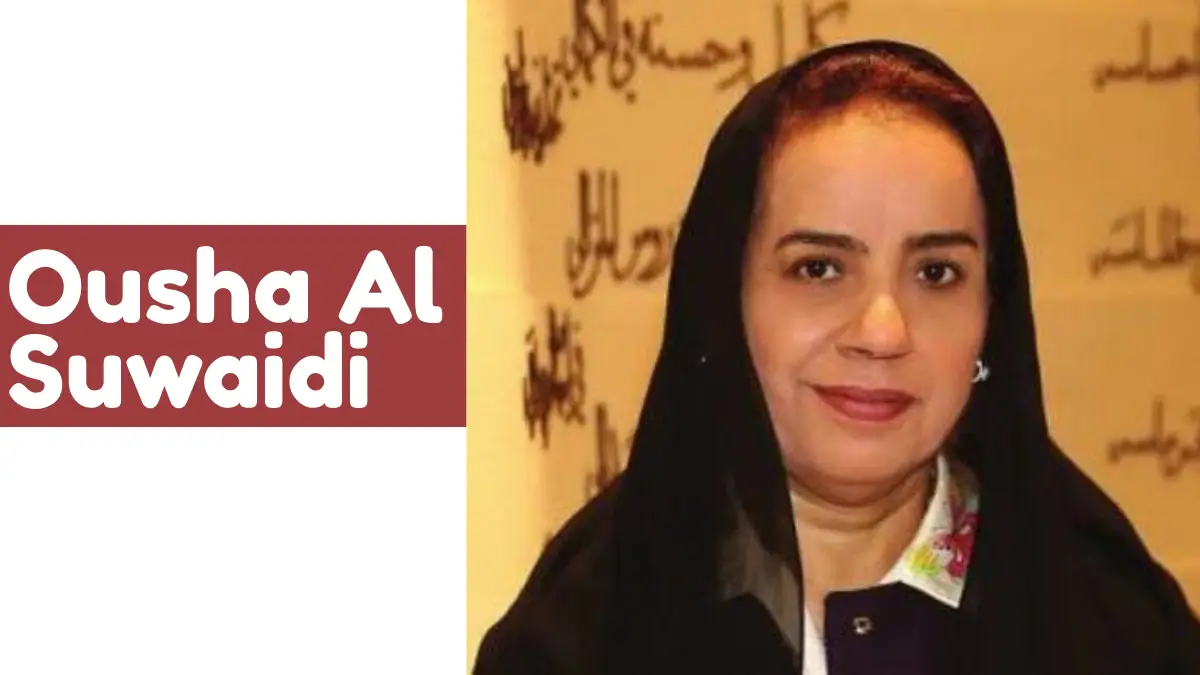
Ousha Al Suwaidi is more than just a name; she is a symbol of cultural pride and a highly respected poet in the UAE. “The Voice of Nabati Poetry” is what they call her. Her work in literature has had a lasting effect on the poetic traditions of the UAE and the rest of the Arab world. Ousha has brought the best of both worlds together in her powerful poems, showing the world how rich Nabati poetry is.
Nabati poetry has a long history that shows the lives, struggles, and dreams of the people who live in the desert. It comes from the Bedouin traditions of the Arabian Peninsula. Ousha is one of the most famous female poets in the UAE because she can weave personal and cultural stories into her poems. Her work not only captures the spirit of the Emirati people, but it also takes Nabati poetry to new heights. This article will look at her life, her poetry, and the lasting effect she had on the world of literature.
Biography of Ousha bint Khalifa Al Suwaidi (فتاة العرب)
| Attribute | Details |
|---|---|
| Name | Ousha bint Khalifa Al Suwaidi |
| Nickname | فتاة العرب (Girl of Arabia) |
| Birthdate | October 1, 1926 |
| Nationality | Emirati |
| Occupation | Poet, Writer |
| Known For | Contributions to Arabic poetry, especially for her works reflecting Emirati culture and heritage |
| Language | Arabic |
| Legacy | Considered one of the most prominent female poets in the UAE and the Arab world, recognized for her literary talent and influence. |
Life and Background in the Past
Ousha Al Suwaidi was born in the UAE and grew up with the customs of the Arabian Peninsula. She grew up in a time when women’s voices were often pushed aside, but her love of poetry grew in a traditional family setting. She learned about the rhythms and cadences of Nabati poetry at a young age because she grew up in a place where her ancestors’ oral traditions were very strong. This early connection to the poetic forms of her culture set the stage for her future in writing.
Ousha’s love of poetry came from the stories, songs, and other cultural expressions that have been passed down through the generations since she was a child. The desert, the camels, and the Bedouin way of life that has been going on for hundreds of years gave her an endless source of ideas. However, female poets didn’t have many chances to share their work with the public because they grew up in a conservative society. Even with these limitations, Ousha’s desire to make a name for herself in the world of poetry never wavered. She eventually became known for her ability to write and perform poems that deeply moved the people around her.
Ousha Al Suwaidi’s Rise in Nabati Poetry
People often think of Nabati poetry as the most traditional type of Arabic poetry. It talks about love, loss, bravery, and the natural world, and it comes from the desert. Ousha Al Suwaidi’s rise in Nabati poetry is a story of going against what people expect and embracing her cultural roots. Ousha broke down barriers in a time when there weren’t many women poets in public. She used her poetic voice to share the thoughts, fears, and hopes of the Emirati people.
People admired and resisted her first foray into Nabati poetry. Some people called her a revolutionary figure in Emirati literature, while others questioned her place in a field of poetry that was mostly male. But people and critics alike loved her because she was real and dedicated to her work. People could relate to Ousha’s poetry because it was based on her own life, struggles, and cultural values.
Ousha Al Suwaidi was a pioneering female poet in the 20th and 21st centuries who made a big impact on the Emirati literary scene. She wrote about her own life, but she also used poetry to talk about social issues, politics, and gender equality. Ousha’s poems gave a voice to people who were often silenced and helped her break free from the rules of society.
Important Ideas in Ousha Al Suwaidi’s Poetry
Ousha Al Suwaidi’s poetry is deeply concerned with themes that relate to the human condition, especially those that come from the UAE’s desert traditions. Her poems talk about love, longing, loyalty, loss, and the strength of being connected to each other and to the land.
Love and romance
Ousha’s poems, like those of many other Nabati poets, often explore the many layers of love. Her poems do a great job of showing how love can be both beautiful and sad. She uses her words to paint a clear picture of love, loss, and the deep bond between lovers. Her poems about love are timeless and universal, so anyone can relate to them.
Life and Nature in the Desert
You can see that Ousha loves the desert in a lot of her work. The UAE’s deserts have huge, harsh, but beautiful landscapes that are important to her poems. Her words make the desert come alive by showing that it is not just a barren, empty place, but also a place to think, be strong, and find beauty. Her poems often use images of sand dunes, oases, and camels, which are all symbols of strength and survival in the harsh desert.
Commentary on social and political issues
Ousha’s poems also show how well she understands social and political issues. She has used her work to speak out against societal norms, question the way things are, and fight for women’s rights. She stands out from other poets in the area because she can combine social commentary with traditional poetic forms.
Gender and Power
Ousha has often written about themes of female empowerment in her work because she is a woman who is breaking into the male-dominated world of Nabati poetry. Her poems show that she is fighting for equality and recognition, both in the literary world and in society as a whole. She has used her platform to fight against the traditional roles that women are given and to call for more freedom of speech.
Read More Here: Dr. Saniya Habboub | Biography, Career, Education & More
Ousha Al Suwaidi’s Role in Emirati Literature
Ousha Al Suwaidi’s work in Emirati literature is very important. She has been very important in keeping the art of Nabati poetry alive and important in the modern world. Ousha has made a name for herself in a field that is usually dominated by men. She is one of the most well-known female writers in the UAE.
Her poems have helped Nabati poetry go from being a regional style to an international one, which has brought attention to the richness of Emirati culture around the world. She has shown the world through her writing that Nabati poetry can be used for more than just cultural expression; it can also be used to bring about social change.
Ousha has brought Nabati poetry back to life by mixing old themes with modern ideas. A lot of people have translated her works into other languages, and her work continues to inspire new generations of poets and writers in the UAE and beyond.
Ousha Al Suwaidi’s Most Famous Poems and Works
Ousha Al Suwaidi has written many well-known poems and collections over the course of her career. Each of her poems gives us a look into her soul by showing us her own life and the bigger ideas in her culture.
One of her best-known works is a book of poems about the difficulties of love, war, and the desert. Her poems are known for their beautiful language, deep feelings, and unique take on Emirati culture. Readers in the UAE and around the world have liked Ousha’s work, and critics and fans have praised it.
“Al Aswat,” one of her most famous poems, looks at how language and voice can shape who we are and where we come from. This poem has been praised as a great work of modern Nabati poetry because it mixes old and new styles.
Recognition and Legacy
Ousha Al Suwaidi’s legacy goes well beyond her poetry. She is now a symbol of cultural pride in the UAE and a global ambassador for Nabati poetry. She has won many awards and gotten a lot of attention from both Emirati and international institutions for her work in literature.
Her work has motivated many young poets, particularly women, to follow their aspirations of becoming authors. Ousha’s success shows that women poets are important for keeping the UAE’s cultural traditions alive and changing them.
Ousha’s poetry is still read and praised at cultural institutions, schools, and literary festivals all over the Arab world. Her poems are often included in school lessons, and she is still a key figure in talks about the future of Arab literature. Ousha’s influence as the “Voice of Nabati Poetry” will surely continue to shape the world of poetry for many years to come.
To sum up
Ousha Al Suwaidi’s rise from a young poet in the UAE to a well-known figure in the world of Nabati poetry is a story of strength, passion, and cultural pride. Her moving and powerful poems have captured the heart of the desert, the soul of her people, and the many sides of being human.
Her impact on Emirati literature and Nabati poetry is beyond measure, and her legacy as a poet, a woman, and a cultural icon will continue to inspire people for years to come. Ousha has firmly established her place in the literary canon of the UAE as “The Voice of Nabati Poetry.” She has shown that poetry is not only a form of art, but also a powerful tool for social change and personal expression.
FAQ’s
Who is Ousha Al Suwaidi?
Ousha Al Suwaidi is a well-known Emirati poet known as “The Voice of Nabati Poetry.” She is known for her work in traditional poetry and her work to promote women’s rights.
What does Nabati poetry mean?
Nabati poetry is a type of Arabic poetry that comes from the Bedouin culture on the Arabian Peninsula. It often talks about love, nature, and social issues.
What are the most important ideas in Ousha Al Suwaidi’s poems?
Her poems are about love, nature, the desert, social issues, gender equality, and empowerment.
What effect has Ousha Al Suwaidi had on Emirati literature?
Ousha has been very important in bringing Nabati poetry back to life. She has made it easier for modern readers to understand and relate to while keeping its traditional meaning.
What are some of Ousha Al Suwaidi’s most well-known books?
“Al Aswat” is one of her most famous works, along with poems about love, war, and the desert.
What has Ousha Al Suwaidi done to help women’s rights?
Ousha has used her poetry to bring attention to problems with gender equality and women’s empowerment, making it easier for women to get involved in literature.
What sets Ousha Al Suwaidi’s poetry apart from other poets?
What makes her poetry unique is how she combines traditional Nabati forms with modern themes to make a strong emotional connection with her readers.
Where can I find Ousha Al Suwaidi’s poems?
Her poems can be found in a lot of anthologies and literary journals, and they have been translated into a number of languages, so people all over the world can read them.
Has Ousha Al Suwaidi won any awards?
Yes, Ousha has won many awards for her poetry, which has made her one of the most important writers in Emirati and Arab literature.
What will Ousha Al Suwaidi leave behind?
Ousha’s legacy is that she was a pioneer in Nabati poetry and had a big impact on modern Emirati literature. She also inspired future poets.
Check More:
Share this article
Written by : UAE Script Staff
Follow us
A quick overview of the topics covered in this article.
Latest articles
February 3, 2026
February 3, 2026
February 3, 2026


